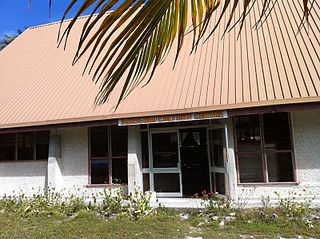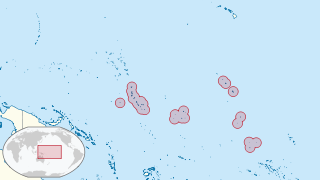Related Research Articles

The government of the Federated States of Micronesia (FSM) conducts its own foreign relations. Since independence in 1986, the FSM has established diplomatic relations with 92 countries, including all of its Pacific neighbors.

Kiribati, officially the Republic of Kiribati, is an island country in the Micronesia subregion of Oceania in the central Pacific Ocean. Its permanent population is over 119,000 as of the 2020 census, with more than half living on Tarawa atoll. The state comprises 32 atolls and one remote raised coral island, Banaba. Its total land area is 811 km2 (313 sq mi) dispersed over 3,441,810 km2 (1,328,890 sq mi) of ocean.

Demographic features of the population of Kiribati include population density, ethnicity, education level, health of the populace, economic status, religious affiliations and other aspects of the population.

Kiribati is a full member of the Commonwealth, the IMF and the World Bank, and became a full member of the United Nations in 1999. Kiribati hosted the Thirty-First Pacific Islands Forum in October 2000. Kiribati has Least Developed Country Status and its interests rarely extend beyond the region. Through accession to the Lomé Convention, then Cotonou Agreement, Kiribati is also a member of the African Caribbean and Pacific Group. Kiribati maintains good relations with most countries and has particularly close ties to Pacific neighbours Japan, Australia, South Korea and New Zealand. Kiribati briefly suspended its relations with France in 1995 over that country's decision to renew nuclear testing in the South Pacific.

Natural resources are resources that are drawn from nature and used with few modifications. This includes the sources of valued characteristics such as commercial and industrial use, aesthetic value, scientific interest, and cultural value. On Earth, it includes sunlight, atmosphere, water, land, all minerals along with all vegetation, and wildlife.

The Pacific Islands Forum (PIF) is an inter-governmental organization that aims to enhance cooperation between countries and territories of Oceania, including formation of a trade bloc and regional peacekeeping operations. It was founded in 1971 as the South Pacific Forum (SPF), and changed its name in 1999 to "Pacific Islands Forum", so as to be more inclusive of the Forum's Oceania-spanning membership of both north and south Pacific island countries, including Australia. It is a United Nations General Assembly observer.

Anote Tong is an I-Kiribati politician for the Pillars of Truth party and environmental activist with half Chinese heritage, who served as President of Kiribati, from 2003 to 2016. He won the election in July 2003 with a slim plurality of votes cast (47.4%) against his older brother, Harry Tong (43.5%) and the private lawyer Banuera Berina (9.1%). The elections were contested by the opposition, due to allegations of electoral fraud but the High Court of Tarawa had confirmed that there was no fraud. He was re-elected on 17 October 2007 for a second term (64%). In 2012, Tong was reelected for a third term, although with a significantly smaller percentage than in the previous two elections.

The important town of Bairiki, which is located in South Tarawa, Kiribati, is crucial to the country's political and administrative structure. This region houses important governmental organizations and diplomatic missions, making it the center of national politics and international affairs.

South Tarawa is the capital and hub of the Republic of Kiribati and home to more than half of Kiribati's population. The South Tarawa population centre consists of all the small islets from Betio in the west to Bonriki and Tanaea in the north-east, connected by the South Tarawa main road, with a population of 63,439 as of 2020.

Bikenibeu is a settlement in Kiribati. It is located close to the southeastern corner of the Tarawa atoll, part of the island country of Kiribati. It is part of a nearly continuous chain of settlements along the islands of South Tarawa, which are now linked by causeways. The low-lying atoll is vulnerable to sea level rise. Rapid population growth has caused some environmental problems. Kiribati's main government high school, King George V and Elaine Bernachi School, is located in Bikenibeu, as well as the Ministries of Environment and Education.

Christianity is the predominant religion in Kiribati, with Catholicism being its largest denomination.
Education in Kiribati is free and compulsory from age 6 to 14, which includes primary school through grade six, and Junior Secondary School for three additional grade levels. In 1998, the gross primary enrollment rate was 84.4 percent, and net primary enrollment rate was 70.7 percent. School quality and access to education are better in urban areas; schools in small communities on isolated islands are expensive to maintain. Mission schools are slowly being absorbed into the government primary school system.

Sustainability measurement is a set of frameworks or indicators to measure how sustainable something is. This includes processes, products, services and businesses. Sustainability is difficult to quantify. It may even be impossible to measure. To measure sustainability, the indicators consider environmental, social and economic domains. The metrics are still evolving. They include indicators, benchmarks and audits. They include sustainability standards and certification systems like Fairtrade and Organic. They also involve indices and accounting. And they can include assessment, appraisal and other reporting systems. These metrics are used over a wide range of spatial and temporal scales. Sustainability measures include corporate sustainability reporting, Triple Bottom Line accounting. They include estimates of the quality of sustainability governance for individual countries. These use the Environmental Sustainability Index and Environmental Performance Index. Some methods let us track sustainable development. These include the UN Human Development Index and ecological footprints.
Aquaculture in Tonga has been the responsibility of the Ministry of Fisheries since the early 1970s. The main centre for this is the Sopu Mariculture Centre on the main island of Tongatapu, which is operated by the Ministry of Fisheries and was established with the assistance of the Government of Japan. A serious setback was experienced in 1982 as a result of damage caused by Cyclone Isaac.

Teima Onorio is an I-Kiribati politician who has been a Member of the House of Assembly since 1998. She served as Vice President of Kiribati from 2003 to 2016.

The Cabinet of Kiribati is the cabinet of the government of the Republic of Kiribati.

The Ministry of Roads and Urban Development is an Iranian government body in charge of providing and regulating the country's transport infrastructure, as well as setting policies for the housing sector and construction industry. This Ministry was formed on 27 June 2011, when the two ministries of Housing and Urban Development and Roads and Transportation were merged.

India and Kiribati established diplomatic relations in 1985. The High Commission of India in Suva, Fiji is concurrently accredited to Kiribati. Kiribati maintains an Honorary Consulate in New Delhi.

Kiribati and Spain have had bilateral diplomatic relations since 2011. The embassy of Spain in Wellington, New Zealand, is accredited for Kiribati.

The COVID-19 pandemic in Kiribati is part of the ongoing worldwide pandemic of coronavirus disease 2019 caused by severe acute respiratory syndrome coronavirus 2. The virus was confirmed to have reached Kiribati on 18 May 2021.
References
- ↑ "Ministry of Natural Resource Development (MNRD), Fisheries Division". Secretariat of the Pacific Community. Archived from the original on May 9, 2008. Retrieved 2009-05-01.
- ↑ "Papua New Guinea and the Pacific" (PDF). Australian Centre for International Agricultural Research. Archived from the original (PDF) on December 3, 2008. Retrieved 2009-05-01.
- ↑ Andrew John East (2008). A future in the past: urban agroforestry systems in future planned urban settlements in Kiribati, a Pacific case study (PDF). Queensland University of Technology. p. 8.[ permanent dead link ]